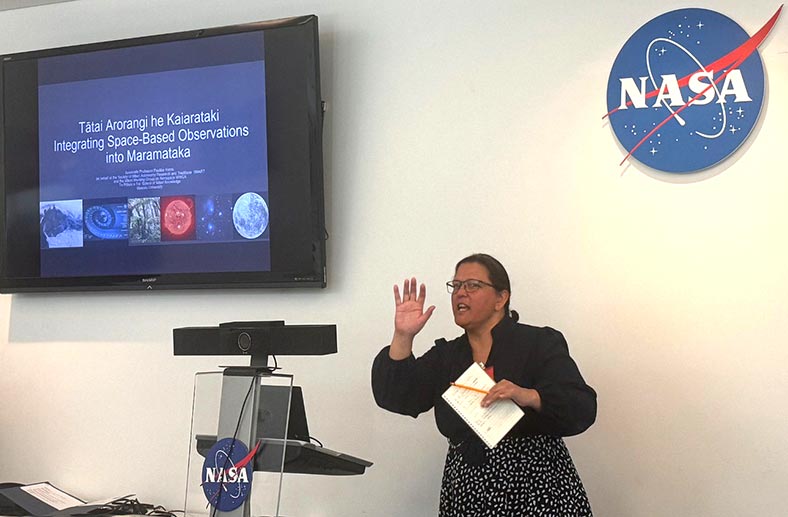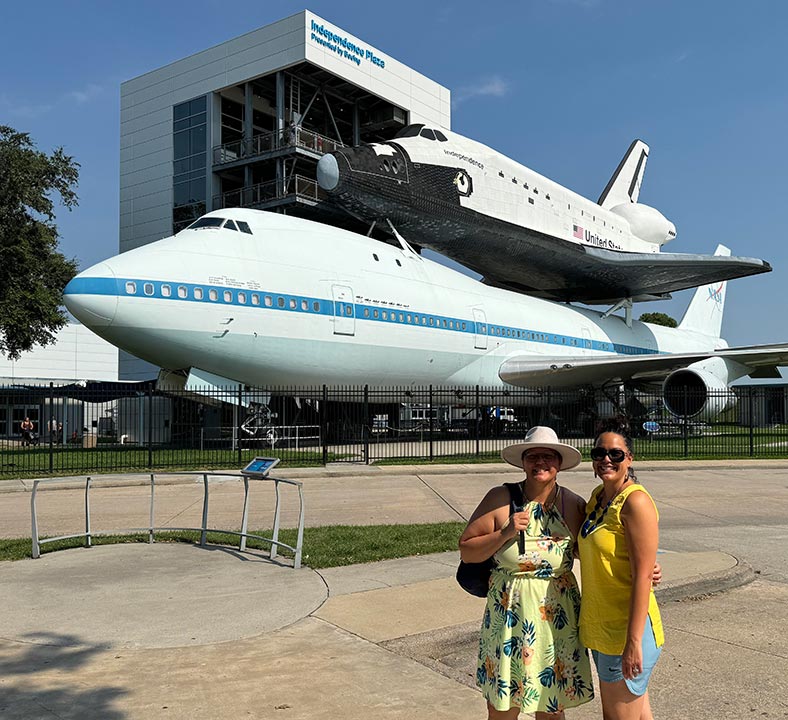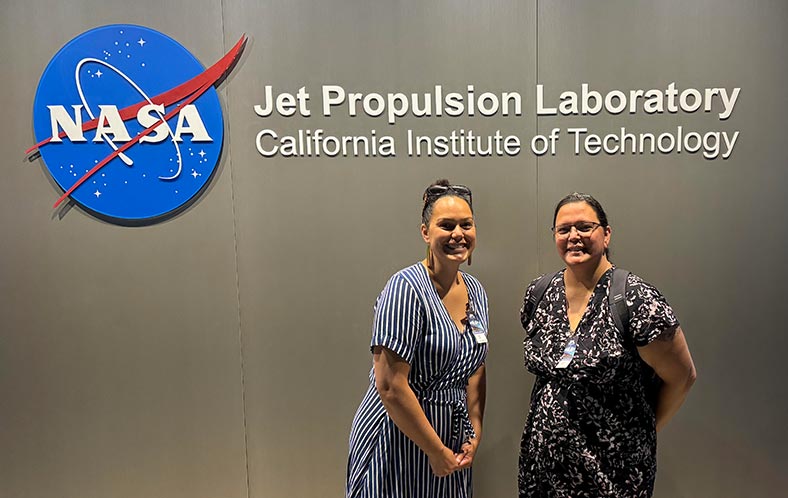New horizons for Māori in aerospace - Annual Report 2024
14 June, 2025
Māori are no strangers to voyages into the unknown. With an ancient mastery of astronomy, Māori ancestors charted the vast Pacific. Reading the stars and their movement across the skies, they found their way to distant, unknown lands with remarkable precision and skill. This journey embodied generations of wisdom passed down about celestial practices, rituals, time systems and navigation. This deep knowledge has been revitalised and will play an important role in reaching new destinations.
"Today, mātauranga Māori offers us a foundational philosophy for space exploration, one that balances technological progress with the health of our ecosystems and the well-being of future generations," says Te Kunenga ki Pūrehuroa Massey University-based Associate Professor Pauline Harris, from Rongomaiwahine, Ngāti Rakaipaaka and Ngāti Kahungunu ki Wairoa.

Pauline Harris at NASA AMES, Silicon Valley, California
Pauline is the Deputy Director Māori of the MacDiarmid Institute and part of the Institute's Mātauranga Māori research programme. Her research project, "Ko tātai arorangi he kaiarataki i te rā: Integrating space-based observations into traditional Māori calendar systems, the maramataka", applies data analytics and machine learning on satellite data to determine Māori environmental monitoring priorities.
"It's important that we keep observing the skies and land to understand how our world is changing and how this will affect our enduring knowledge systems. These earth observations are key to tackling some of the big environmental issues that Māori face," says Pauline.
"To develop this work further, we need to encourage and create opportunities for the next generation of Māori scientists and engineers."
Today, mātauranga Māori offers us a foundational philosophy for space exploration, one that balances technological progress with the health of our ecosystems and the well-being of future generations.
Associate Professor Pauline Harris MacDiarmid Institute Deputy Director Māori
Pauline has been instrumental in building Māori research capability and capacity at the MacDiarmid Institute.
Joining her in this mission is Strategic Manager Māori Kirsty Doyle from Ngāti Kahungunu, Rongomaiwahine and Ngāti Rakaipaaka.
Together, they have led the Discovery Scholarship programme which aims to encourage more Māori and Pacific peoples in the science sector.
"By empowering more Māori and Pacific students to enter scientific and engineering fields, we are laying the foundations to build a science sector that values and promotes diversity, both in people and in perspectives," says Kirsty.

Pauline Harris and Kirsty Doyle in NASA Houston
Pauline and Kirsty recently led a team of researchers to collaborate with NASA's Indigenous Peoples Initiative (IPI) which aims to support Indigenous-led initiatives and projects that utilise NASA data, products and tools.
"With this collaboration, NASA acknowledges and promotes the importance of diversity in worldview within the aerospace sector. These are considerations that aerospace sectors globally should take note of, including right here in Aotearoa New Zealand," says Pauline.
In recent decades, there has been a rapid acceleration in space technologies, sparking a new space race. Amidst these exciting advancements, concerns about sustainability, long-term well-being and the impact on future generations risk becoming mere afterthoughts.
"Rather than this space race being a machine of reckless resource consumption and careless waste production, we can carve out a new path that prioritises the best aspects of humanity," says Pauline.
...to establish a sustainable, healthy, open-minded space industry...
Kirsty Doyle MacDiarmid Institute Strategic Manager Māori

Pauline Harris and Kirsty Doyle at the Jet Propulsion Laboratory, California Institute of Technology in the USA
"We need to seize the opportunity to make Aotearoa New Zealand's place in the space race unique. Set an example to establish a sustainable, healthy, open-minded space industry that is not marred by inequities in opportunity."
Pauline and Kirsty both emphasise that as Aotearoa New Zealand embarks on this voyage into the vast unknown, Māori need to be at the forefront of leadership, decision-making and research based on Māori values and principles.
"We need to embed these principles and values early in this process so that we have a clear vision to aspire to. This starts with creating opportunities for more Māori researchers to explore and develop new knowledge," says Kirsty.
"Here at the MacDiarmid Institute, we are already setting this vision in motion by nurturing Māori scientists to look towards the stars once more to venture into new horizons."


